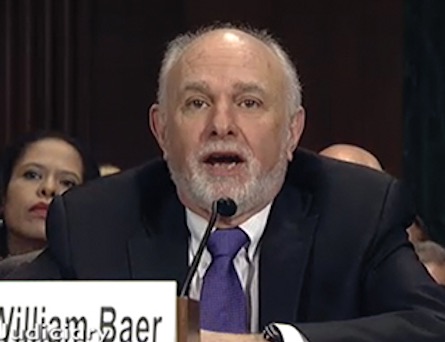DOJ’s Baer Talks Media Deal Conditions

The smarter way to stay on top of broadcasting and cable industry. Sign up below
You are now subscribed
Your newsletter sign-up was successful
At presstime, neither the FCC nor the Department of Justice had come out with a decision on the Charter/Time Warner Cable merger. An FCC source suggested no action was likely last week, but DOJ antitrust chief and assistant attorney general Bill Baer has provided some clues as to what the government is looking for from merged companies in terms of compliance with deal conditions and how Justice intends to enforce them. Think of it as: Antitrust, but verify.
Baer told a Hill panel he thought there were “limited circumstances” where some conduct remedies could be effective. But he signaled they were hardly a panacea. “We don’t rush to them. We are skeptical of them and want to make sure they are effective and enforceable,” he said.
The Charter/TWC deal, if approved as expected, will almost certainly have conditions related to access to video, over-the-top and traditional, as well as on contracts—like “most favored nation” status—that could potentially make it harder for independent programmers to get distribution.
Senator Amy Klobuchar (D-Minn.) had sent the FCC and DOJ a letter back in February asking it to “carefully” vet the Charter/TWC deal for any potential obstacles to accessing alternative video content, something the commission was clearly already doing according to document requests from the companies.
Klobuchar followed up with Baer in the hearing, asking how he was going to make sure the conditions were “truly enforceable,” and whether there were any lessons from recent mergers. Baer said the first question was whether a deal was “fixable” by conditions, or as Klobuchar had suggested might be the case with Charter/TWC, “too big to fix.” Baer said he liked that metaphor as well.
Baer used as an example Comcast/TWC, which he said the Justice Department had concluded was unfixable, and explained why. “The conditions that would have been required to protect consumers would have had my folks as regulators, not antitrust law enforcers. And that is not a role we aspire to nor should we be entrusted with.”
He contrasted that with the Comcast/NBCU merger, where he said they had concluded there were conditions that could protect the competitive risks. Baer suggested those conditions work, adding that from the reports he has been getting he believes those are enforceable and are “getting us the information we need.”
The smarter way to stay on top of broadcasting and cable industry. Sign up below
He also pointed to the opportunities for unhappy content providers to not only talk to the FCC and Justice Department, but also use the option of seeking binding arbitration in the NBCU deal. Dish has recently signaled it would invoke that arbitration condition in a carriage impasse with NBC.
FACING REALITY
The Obama administration took another step last week toward coming up with best practices for the use of facial recognition technology, including for targeted marketing. But civil society groups remained skeptical, and notable for their absence.
At a National Telecommunications & Information Administration workshop, various stakeholders worked on language of a draft proposal for new guidelines as the administration continues a multi-stakeholder process to come up with voluntary enforcement of its privacy “bill of rights.”
But the Fair Information Practice Principles (FIPPS) document is billed only as a “flexible and evolving” road map, while privacy groups argue that it is going down the wrong road. (To read the full language of that document, go to broadcastingcable.com/April4.)
The principles do not apply for aggregate or nonidentifying uses, such as counting the number of people present—rather than identifying who they are—or approximating age or identifying gender for marketing research purposes, according to a copy of the draft. Nor do they apply to law enforcement or national security uses.
Last summer, consumer groups and privacy advocates that had participated in earlier workshops on other elements of the bill of rights pulled out of the process after they concluded it would not produce sufficiently strong privacy protections.
The groups are particularly concerned with what they see as an inability of the industry stakeholders to agree to any variation on an opt-in model for facial recognition. That said, they also indicated that their withdrawal should be taken as a not-so-subtle signal to reevaluate the effectiveness of the process in general.
Contributing editor John Eggerton has been an editor and/or writer on media regulation, legislation and policy for over four decades, including covering the FCC, FTC, Congress, the major media trade associations, and the federal courts. In addition to Multichannel News and Broadcasting + Cable, his work has appeared in Radio World, TV Technology, TV Fax, This Week in Consumer Electronics, Variety and the Encyclopedia Britannica.

